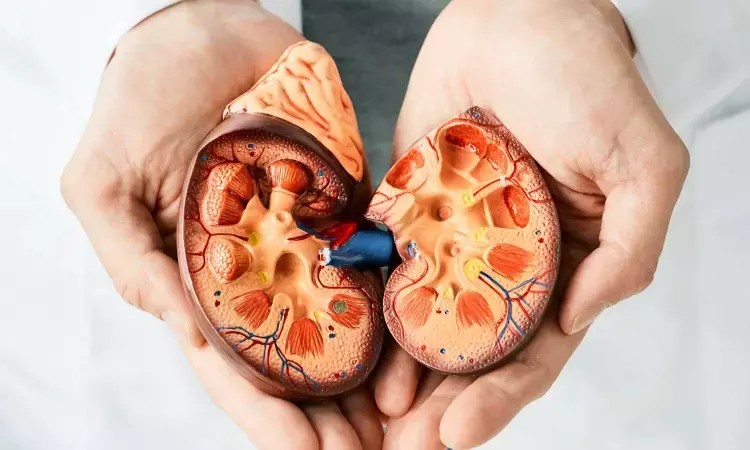- Home
- Medical news & Guidelines
- Anesthesiology
- Cardiology and CTVS
- Critical Care
- Dentistry
- Dermatology
- Diabetes and Endocrinology
- ENT
- Gastroenterology
- Medicine
- Nephrology
- Neurology
- Obstretics-Gynaecology
- Oncology
- Ophthalmology
- Orthopaedics
- Pediatrics-Neonatology
- Psychiatry
- Pulmonology
- Radiology
- Surgery
- Urology
- Laboratory Medicine
- Diet
- Nursing
- Paramedical
- Physiotherapy
- Health news
- Fact Check
- Bone Health Fact Check
- Brain Health Fact Check
- Cancer Related Fact Check
- Child Care Fact Check
- Dental and oral health fact check
- Diabetes and metabolic health fact check
- Diet and Nutrition Fact Check
- Eye and ENT Care Fact Check
- Fitness fact check
- Gut health fact check
- Heart health fact check
- Kidney health fact check
- Medical education fact check
- Men's health fact check
- Respiratory fact check
- Skin and hair care fact check
- Vaccine and Immunization fact check
- Women's health fact check
- AYUSH
- State News
- Andaman and Nicobar Islands
- Andhra Pradesh
- Arunachal Pradesh
- Assam
- Bihar
- Chandigarh
- Chattisgarh
- Dadra and Nagar Haveli
- Daman and Diu
- Delhi
- Goa
- Gujarat
- Haryana
- Himachal Pradesh
- Jammu & Kashmir
- Jharkhand
- Karnataka
- Kerala
- Ladakh
- Lakshadweep
- Madhya Pradesh
- Maharashtra
- Manipur
- Meghalaya
- Mizoram
- Nagaland
- Odisha
- Puducherry
- Punjab
- Rajasthan
- Sikkim
- Tamil Nadu
- Telangana
- Tripura
- Uttar Pradesh
- Uttrakhand
- West Bengal
- Medical Education
- Industry
Discovery explains kidney damage caused by blood pressure drugs

University of Virginia School of Medicine researchers have discovered how long-term treatment of high blood pressure with commonly prescribed drugs can destroy the kidney’s ability to filter and purify blood. The finding could open the door to better ways to manage high blood pressure and other vascular diseases.
The class of drugs, known as renin–angiotensin system (RAS) inhibitors, block the effects of the renin enzyme, relaxing blood vessels and allowing blood to flow more easily. They are widely used as first-line medications for hypertension (high blood pressure). But long-term use can take a terrible toll on the kidney, causing scarring and other dramatic physical changes that shift the organ’s focus from blood filtration to producing renin.
No longer able to clean the blood of impurities, the Frankensteined kidney becomes a “pathological neuro-immune endocrine organ,” as the UVA researchers describe it in a new scientific paper, that can cause serious health problems. But they say their discovery sets the stage for identifying ways to protect the kidney and better treat hypertension.
“The most commonly used and believed-to-be safe blood pressure medications may be damaging the kidneys,” said researcher R. Ariel Gomez, MD, of UVA’s Child Health Research Center. “We need to accurately understand the effects of long-term use of RAS inhibitors on the kidneys.”
Managing High Blood Pressure
High blood pressure affects more than 1.3 billion people around the world. The condition forces the heart to work too hard and can cause a host of other serious medical problems, such as stroke, myocardial infarction, kidney damage and vision loss.
The renin-angiotensin system (RAS) plays a crucial role in regulating blood pressure. Renin is a hormone enzyme that is produced by cells in the kidney which are stimulated when blood pressure drops.
RAS inhibitors are widely and effectively used for managing high blood pressure. They are quite safe when their use is supervised by a physician, but patients are routinely cautioned to contact their doctors if they notice signs of potential kidney damage such as reduced frequency of urination, swelling in the legs or feet or seizures.
The potential effects of chronic inhibition of RAS on the kidney are well known, but experts have been uncertain what causes these harmful changes. UVA’s new discovery offers answers: Excessive stimulation of renin-producing cells in the kidney causes the cells to revert to an invasive, embryonic state. In this state, these cells that line the tiny arteries in the kidney begin to grow too large. They start to secrete renin and substances that trigger other changes: New nerves grow like weeds; immature smooth muscle cells build up; scars form around the tiny blood vessels, called arterioles; and inflammatory cells infiltrate. The end result is “silent but serious” vascular disease, the researchers note in their new paper.
“Our 3D imaging clearly revealed that long-term RAS inhibition leads to hyperinnervation of renal arteries, together with arteriolar hypertrophy and immune inflammatory cell infiltration,” said researcher Manako Yamaguchi, PhD. “This neuro-immune-endocrine cooperation synergistically promotes increased production of renin to maintain blood pressure homeostasis, but, on the other hand, severe arteriolar hypertrophy reduces the blood filtration function of the kidney.”
By understanding what is causing the harmful changes in the kidney, scientists are now positioned to find ways to stop it. That could lead to better ways to treat high blood pressure without unwanted side effects, the researchers hope.
“Our next goal is to elucidate the whole picture of the interactions between renin cells, smooth muscle cells, nerves and inflammatory cells under RAS inhibition,” said researcher Maria Luisa S. Sequeira-Lopez, MD. “These findings may open new avenues for the prevention of adverse effects when treating hypertension.”
Reference:
Manako Yamaguchi, Lucas Ferreira de Almeida, Hiroki Yamaguchi, Xiuyin Liang, Transformation of the Kidney into a Pathological Neuro-Immune-Endocrine Organ, Circulation Research, https://doi.org/10.1161/CIRCRESAHA.124.32530
Dr Kamal Kant Kohli-MBBS, DTCD- a chest specialist with more than 30 years of practice and a flair for writing clinical articles, Dr Kamal Kant Kohli joined Medical Dialogues as a Chief Editor of Medical News. Besides writing articles, as an editor, he proofreads and verifies all the medical content published on Medical Dialogues including those coming from journals, studies,medical conferences,guidelines etc. Email: drkohli@medicaldialogues.in. Contact no. 011-43720751


